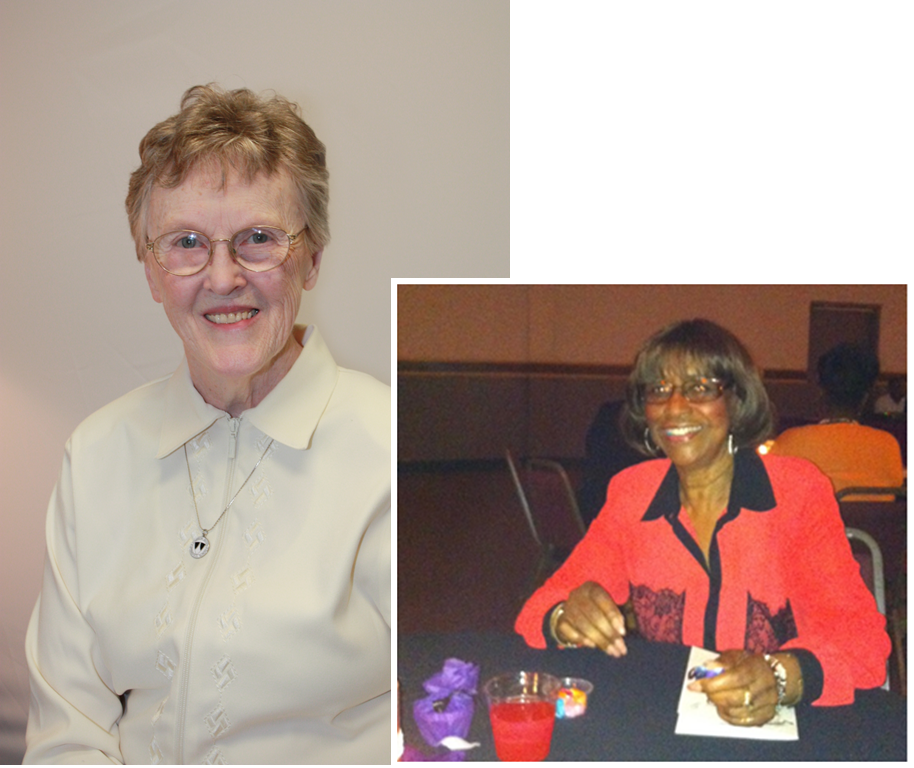This week Father Gerry Kleba, retired pastor of St. Cronan's Parish, St. Louis, contacted me about his long-ago friend, our Sister Maxine Riker. When I shared the news that Sister Maxine died in 2015, he replied by sharing this story, which we publish with his permission. His friend Charlene, who is central to this story (seen above with Sister Maxine), passed on to glory on March 20.
Put that Sword Back in its Place
Father Gerry Kleba's reflection on the Passion Sunday Gospel (Matthew 26:52)
April 6, 2020
Charlene Armstead, one of my first and dearest African American friends from Visitation Parish, is in hospice after years of dwindling health in a nursing home. She became a widow very early when her husband died of a heart attack at a Chicago naval base, leaving her with her five-year-old son, Lance. While returning to St. Louis in 1960 she had car problems and stopped for repairs at Art’s Service Station/Cafe in Farmersville, Ill.
While her car was in the shop she took little Lance to the cafe for ice cream. The man at the counter with a double barrel shot gun by the register ordered, “Get Out!”
In 1990, Springfield Dominican Sister Maxine Riker, OP, came to do a practicum at St. Bridget’s Parish. In her first days there, we went on a ‘getting to know you’ stroll in Forest Park. I was astonished when she told me she was from Farmersville, Ill. I had instant recall of Charlene’s frightful incident so I questioned her about Art’s Cafe.
She said, “Art is my uncle.” I got chills. After I related Charlene’s story, Maxine’s face blanched and she stammered, “Let me tell you about Art. Years ago, one night a black man came to rob the filling station and he shot and killed Art’s son. Art’s never gotten over that and the family has been in constant grief ever since.”
1992 was my twenty-fifth anniversary of priestly ordination and I planned a celebration to exemplify the meaning of my life, A Healing Touch. The four aspects of healing I highlighted were: healing poverty, healing religious divisions, healing the environment, and healing racism.
In planning the ceremony, I talked to Charlene, asking her if I could invite Sister Maxine from her hospital ministry in Arkansas to come and stay with her over the weekend and they could tell their story. She agreed, and when I called Maxine she was delighted. Sister Maxine came to St. Louis, stayed in Charlene’s home, and on a Saturday afternoon at the St. Louis Cathedral they faced each other, Maxine in Dominican white and Charlene in a dashiki, held hands, and tearfully told their family tales. Then they embraced, throbbing in tears, and kissed each other as the assembly dabbed the trickles on their cheeks and squinted away tears.
The celebration concluded with the first black Metropolitan Opera singer, Robert McFarrin, Sr., singing The Lord’s Prayer. When I invited him to celebrate with us he told me he was flattered but added apologetically, “Father, I've had a stroke and can’t remember the words of many songs that I always knew before.” I assured him that the one he remembered was my first choice and was perfect.
In honor of these two preaching women, listen to Robert McFarrin, Sr. sing "Ain't Got Time to Die."
Learn about the Dominican Sisters'
Commitment to Dismantling Racism
Sister Maxine was a dedicated member of SDART, the Springfield Dominican Antiracism Team. Learn more about the people and the mission that motivated her to the end of her life.



Great story and amazing women
Great story. Did not know Sister Maxine passed away, she was my favorite teacher and I will always remember her fondly.